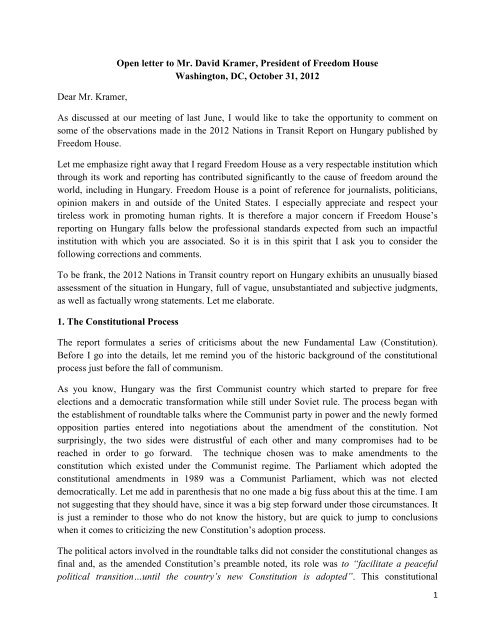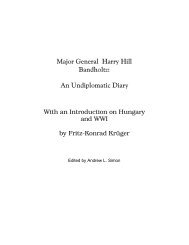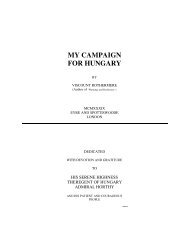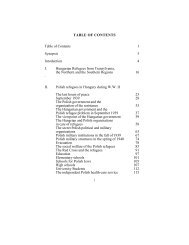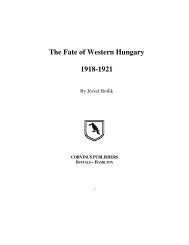Open letter to Mr. David Kramer, President of Freedom House ...
Open letter to Mr. David Kramer, President of Freedom House ...
Open letter to Mr. David Kramer, President of Freedom House ...
Create successful ePaper yourself
Turn your PDF publications into a flip-book with our unique Google optimized e-Paper software.
Dear <strong>Mr</strong>. <strong>Kramer</strong>,<strong>Open</strong> <strong>letter</strong> <strong>to</strong> <strong>Mr</strong>. <strong>David</strong> <strong>Kramer</strong>, <strong>President</strong> <strong>of</strong> <strong>Freedom</strong> <strong>House</strong>Washing<strong>to</strong>n, DC, Oc<strong>to</strong>ber 31, 2012As discussed at our meeting <strong>of</strong> last June, I would like <strong>to</strong> take the opportunity <strong>to</strong> comment onsome <strong>of</strong> the observations made in the 2012 Nations in Transit Report on Hungary published by<strong>Freedom</strong> <strong>House</strong>.Let me emphasize right away that I regard <strong>Freedom</strong> <strong>House</strong> as a very respectable institution whichthrough its work and reporting has contributed significantly <strong>to</strong> the cause <strong>of</strong> freedom around theworld, including in Hungary. <strong>Freedom</strong> <strong>House</strong> is a point <strong>of</strong> reference for journalists, politicians,opinion makers in and outside <strong>of</strong> the United States. I especially appreciate and respect yourtireless work in promoting human rights. It is therefore a major concern if <strong>Freedom</strong> <strong>House</strong>’sreporting on Hungary falls below the pr<strong>of</strong>essional standards expected from such an impactfulinstitution with which you are associated. So it is in this spirit that I ask you <strong>to</strong> consider thefollowing corrections and comments.To be frank, the 2012 Nations in Transit country report on Hungary exhibits an unusually biasedassessment <strong>of</strong> the situation in Hungary, full <strong>of</strong> vague, unsubstantiated and subjective judgments,as well as factually wrong statements. Let me elaborate.1. The Constitutional ProcessThe report formulates a series <strong>of</strong> criticisms about the new Fundamental Law (Constitution).Before I go in<strong>to</strong> the details, let me remind you <strong>of</strong> the his<strong>to</strong>ric background <strong>of</strong> the constitutionalprocess just before the fall <strong>of</strong> communism.As you know, Hungary was the first Communist country which started <strong>to</strong> prepare for freeelections and a democratic transformation while still under Soviet rule. The process began withthe establishment <strong>of</strong> roundtable talks where the Communist party in power and the newly formedopposition parties entered in<strong>to</strong> negotiations about the amendment <strong>of</strong> the constitution. Notsurprisingly, the two sides were distrustful <strong>of</strong> each other and many compromises had <strong>to</strong> bereached in order <strong>to</strong> go forward. The technique chosen was <strong>to</strong> make amendments <strong>to</strong> theconstitution which existed under the Communist regime. The Parliament which adopted theconstitutional amendments in 1989 was a Communist Parliament, which was not electeddemocratically. Let me add in parenthesis that no one made a big fuss about this at the time. I amnot suggesting that they should have, since it was a big step forward under those circumstances. Itis just a reminder <strong>to</strong> those who do not know the his<strong>to</strong>ry, but are quick <strong>to</strong> jump <strong>to</strong> conclusionswhen it comes <strong>to</strong> criticizing the new Constitution’s adoption process.The political ac<strong>to</strong>rs involved in the roundtable talks did not consider the constitutional changes asfinal and, as the amended Constitution’s preamble noted, its role was <strong>to</strong> “facilitate a peacefulpolitical transition…until the country’s new Constitution is adopted”. This constitutional1
“legitimacy deficit” was acknowledged by political scientists, constitutional scholars and allac<strong>to</strong>rs involved in the process as well. Until the current government <strong>to</strong>ok power in 2010, a newconstitution could not be adopted for the simple reason that the two-thirds majority needed <strong>to</strong>change the Constitution had been lacking. Hence <strong>to</strong> suggest, as the Report does in many explicitand implicit ways, that for a democratically elected government disposing <strong>of</strong> the supermajority <strong>to</strong>undertake the daunting task <strong>of</strong> remedying a constitutional deficit that has been on the politicalagenda for 22 years is no more than a political maneuver <strong>to</strong> solidify its own power shows a lack<strong>of</strong> basic understanding <strong>of</strong> Hungary’s constitutional heritage and a complete ignorance <strong>of</strong>his<strong>to</strong>rical facts.Let us then go in<strong>to</strong> some <strong>of</strong> the details.1. The Fundamental Lawa. The Report says: “In 2011, a new constitution was passed by the governing Fidesz-KDNPcoalition without any meaningful consultation.”The parliamentary majority made a serious effort <strong>to</strong> engage stakeholders. The drafting committeereached out <strong>to</strong> all <strong>of</strong> the major public <strong>of</strong>fice holders, national associations <strong>of</strong> the national andethnic minorities, national interest groups <strong>of</strong> the local governments, the Institute <strong>of</strong> Legal Studies<strong>of</strong> the Hungarian Academy <strong>of</strong> Sciences, and also <strong>to</strong> the departments <strong>of</strong> constitutional law <strong>of</strong> allstate universities, as well as the churches and foundations, in order <strong>to</strong> ask for their legal opinionsand expert advice. Many <strong>of</strong> these organizations submitted proposals which were considered anddebated by the committee and were made available on the Parliament’s website. Theparliamentary groups <strong>of</strong> every party in Parliament, as well as every independent MP, wererequested <strong>to</strong> submit a proposed draft constitution, but such drafts were only received from thegoverning parties – Fidesz and KDNP – and one independent Member <strong>of</strong> Parliament, Ms. KatalinSzili (the former Socialist Speaker <strong>of</strong> the Parliament). In addition <strong>to</strong> these efforts, the NationalConsultation Committee sent out a questionnaire which close <strong>to</strong> one million people returned andtheir responses were taken in<strong>to</strong> account when the Parliament <strong>to</strong>ok its final vote on the draft.It was a political decision made by the opposition parties not <strong>to</strong> be involved in any meaningfulway in the expert work that was required during the drafting process as a means <strong>of</strong> trying <strong>to</strong>undermine and discredit the governing parties and the political legitimacy <strong>of</strong> the newconstitution.b. The Report says: “The increased range <strong>of</strong> laws that will require a supermajority <strong>to</strong> pass inthis new constitutional framework will likely damage the effectiveness <strong>of</strong> future governments.”In fact, the Fundamental Law contains approximately the same amount <strong>of</strong> supermajority laws(so-called “cardinal laws” that require a two-thirds majority in Parliament <strong>to</strong> amend) as theprevious Constitution. The raison d’être <strong>of</strong> the cardinal laws was that the participants <strong>of</strong> theroundtable talks who worked out Hungary’s new constitutional order were uncertain <strong>of</strong> the results2
<strong>of</strong> the first democratic elections and, being distrustful <strong>of</strong> each other, wanted <strong>to</strong> secure the politicalcompromises reached in 1989.c. The Report says: “A new law on the Constitutional Court further limits citizens’ access <strong>to</strong> thebody”. Further: “As part <strong>of</strong> the broader drive <strong>to</strong> eliminate checks and balances in the country’sconstitutional framework, in 2010 the government had amended the old constitution <strong>to</strong> strip theConstitutional Court <strong>of</strong> its jurisdiction over important matters that were already closed <strong>to</strong> publicinput via referendums.”“Limiting citizen’s access” is a reference <strong>to</strong> the abolishment <strong>of</strong> actio popularis. The idea <strong>of</strong>giving the widest possible access <strong>to</strong> the Constitutional Court through the institution <strong>of</strong> actiopopularis was a way <strong>of</strong> securing the newly created democratic system after the regime change.However, as many constitutional scholars have pointed out, this institution represents a majorburden on a constitutional court. Exactly for this reason, actio popularis is very rarelyfeatured in constitutions. This is why the <strong>President</strong> <strong>of</strong> the Hungarian Constitutional Court, in an<strong>of</strong>ficial <strong>letter</strong>, urged the drafting committee <strong>to</strong> abolish it. Having tested the pros and cons <strong>of</strong> actiopopularis for over 20 years, the Court’s reasoned view can hardly be dismissed as a politicalmove or labeled as the erosion <strong>of</strong> the constitutional framework. However, while abolishing thisinstitution, the Fundamental Law expands the authority <strong>of</strong> the Court by empowering it <strong>to</strong> reviewany other court ruling for conformity with the Fundamental Law on the basis <strong>of</strong> an individualconstitutional complaint. This is a major step <strong>to</strong>ward strengthening the powers <strong>of</strong> the Court.The Report ignores all this and makes a summary and biased judgment.d. The Report says: “…cases regarding the right <strong>to</strong> private property are also outside thecourt’s purview.”This is an inaccurate reference <strong>to</strong> the provision <strong>of</strong> the Fundamental Law (Article 37) whichcontains a limitation on its power <strong>to</strong> “review Acts on the State Budget and its implementation, thecentral tax type, duties, pension and healthcare contributions, cus<strong>to</strong>ms and the central conditionsfor local taxes”. However, the Court actually retained the authority <strong>of</strong> reviewing these laws “forconformity with the Fundamental Law or annul the preceding Acts due <strong>to</strong> violation <strong>of</strong> the right <strong>to</strong>life and human dignity, the right <strong>to</strong> the protection <strong>of</strong> personal data, freedom <strong>of</strong> thought,conscience and religion, and with the rights related <strong>to</strong> Hungarian citizenship.” This is a powerwhich the current Constitutional Court has already used when it annulled a tax law (on retroactivetaxes on severance payments) passed by the Parliament in 2011 (see Decision 37/2011).Furthermore, this restriction only applies “as long as the state debt exceeds half <strong>of</strong> GrossDomestic Product.”The Fundamental Law explicitly states that “Every person shall have the right <strong>to</strong> property andinheritance” (Article XIII). As I pointed out above, the Court retains the authority <strong>to</strong> review theconformity <strong>of</strong> all laws with the Fundamental Law, so the Report’s claim that private property isgenerally exempted from the Court’s purview is seriously misleading and factually incorrect.3
e. The Report says: “The preamble’s heavy reliance on Christian language—in a country wherereligious attendance is around 13 percent—is particularly controversial….”What the report calls “Christian language” is the Preamble’s quote from the first paragraph <strong>of</strong> theHungarian National Anthem (“God bless the Hungarians”), a symbol <strong>of</strong> national unity for morethan 150 years, sung by Hungarians at every major public and private ceremony. The Preamblealso explicitly acknowledges the important part Christianity has played in Hungarian his<strong>to</strong>ry. It isa his<strong>to</strong>rical fact that Hungary’s birth as a European nation is intimately linked with Hungary’sKing Saint Stephen’s unifying the nation under the umbrella <strong>of</strong> Christianity. To quote theFundamental Law: “We recognize the role <strong>of</strong> Christianity in preserving nationhood. We value thevarious religious traditions <strong>of</strong> our country.” Is that heavy reliance on Christian language? Andhow does this threaten democracy which is the underlying theme <strong>of</strong> the report? Surely, theinscription “in God we trust” on the dollar bill, or on the U.S. Capi<strong>to</strong>l’s <strong>House</strong> Chamber is not athreat <strong>to</strong> democracy.The Report’s mention <strong>of</strong> the low level <strong>of</strong> active church attendance as a reason <strong>to</strong> criticize theFundamental Law’s reference <strong>to</strong> Christianity is unpr<strong>of</strong>essional at best, and insulting at worst.The low level <strong>of</strong> active church attendance is one <strong>of</strong> the most visible vestiges <strong>of</strong> the Communistera during which active church attendance was regarded with suspicion – <strong>to</strong> say the least, andchurch-run schools were closed, but it does not mean that the Christian affiliation <strong>of</strong> Hungariansceased <strong>to</strong> exist. In fact, the vast majority <strong>of</strong> Hungarians regard themselves Christians, according<strong>to</strong> the latest census. The “controversy” that the Report cites in connection with the “Christianlanguage” is articulated only by a very small group <strong>of</strong> left-liberal thinkers, but is not the realityfor most <strong>of</strong> Hungarians.Frankly, this criticism <strong>of</strong> the Report is a very cheap shot from an institution like the <strong>Freedom</strong><strong>House</strong> created by a country like the United States where the words “God bless America” is onevery American’s lips no matter what his or her religious affiliation or beliefs are.2. Religion LawThe Report says: “A new law on religions …..grants formal recognition <strong>to</strong> only 14 religiousgroups, down from the previously recognized 352. Further: “Beginning in 2012, all otherreligious groups will lose the financial privileges associated with recognition and will insteadfunction as associations.” Further: “The fact that they will lose their financial privileges and beexcluded from the 1 percent income tax scheme will substantially decrease their revenues. Thechange in designation will also affect their ability <strong>to</strong> own land and participate in the provision <strong>of</strong>public services.”Again, a little background is needed here. Many <strong>of</strong> the 350 or so churches registered under theprevious law had existed as churches in name only and were in reality for-pr<strong>of</strong>it organizationsestablished <strong>to</strong> take advantage <strong>of</strong> tax benefits given <strong>to</strong> churches. The Government decided <strong>to</strong>4
tackle this abuse <strong>of</strong> privilege head-on <strong>to</strong> provide more transparency <strong>of</strong> taxpayer money spent onsupporting religious activities in conformity with democratic norms.To be clear, the Fundamental Law guarantees the freedom <strong>of</strong> religion: “Every person shall havethe right <strong>to</strong> freedom <strong>of</strong> thought, conscience and religion” (Article VII). Recognition byParliament as a church is by no means a precondition <strong>of</strong> the free exercise <strong>of</strong> religion in Hungary.Rather, the principle <strong>of</strong> recognition is based on the notion that if taxpayer money is spent onsupporting a church for its religious and social services, then those on the receiving end shouldstand the test <strong>of</strong> public scrutiny and prove that they are not pr<strong>of</strong>it-seeking entities. In December2011, Parliament registered 14 churches based on their his<strong>to</strong>rical presence and socialsignificance. In February 2012, another 18 churches were registered. The Government has madeit very clear that the list <strong>of</strong> registered churches is open and expandable.A religious community not <strong>of</strong>ficially recognized as a church can apply for recognition as areligious association and thus remains eligible for receiving 1 percent <strong>of</strong> an individual taxpayer’sincome tax under the laws regulating civil society organizations. It may continue <strong>to</strong> own landand can call itself a “church” even in the absence <strong>of</strong> <strong>of</strong>ficial recognition as a church. A change inits status also does not restrict its ability <strong>to</strong> provide public services, such as maintaining schools,social institutions or hospitals. And if it provides such public services it could apply for statesubsidy.Unfortunately, none <strong>of</strong> this is mentioned in the Report.3. Media LawLet me first say that the media law was submitted <strong>to</strong> the European Commission for comment andseveral <strong>of</strong> its recommendations were subsequently adopted. The Report itself acknowledges that“the Hungarian media market can be considered vibrant”, that “slowly, but steadily,investigative journalism has also been developing” and takes note <strong>of</strong> the “flourishing scene <strong>of</strong>high-quality political blogs”. It notes – incorrectly – that government appointees now have“considerable power <strong>to</strong> limit the freedom <strong>of</strong> expression” but it also acknowledges that the “newlaw has not yet been used <strong>to</strong> gag dissenting voices”.Then why does the Report mark down Hungary in the category <strong>of</strong> independent media?The report goes on <strong>to</strong> say that substantial penalties foreseen in the law and “vaguely wordedprovisions” have undermined freedom <strong>of</strong> expression by creating a “chilling effect” resulting inself-censorship. Does the Report have any tangible pro<strong>of</strong> <strong>of</strong> that in light <strong>of</strong> the above statementspraising the vibrancy <strong>of</strong> the media market? Isn’t that just another subjective statement? About75% <strong>of</strong> the media is private, <strong>of</strong> which 80% is foreign-owned. Did the authors contact the foreignowners <strong>to</strong> check?The law is actually quite specific on the technical infringements where a fine can be levied.However, many critics who have not taken the trouble <strong>to</strong> read the law associate the fines with theprovision <strong>of</strong> the law that speaks about the requirement for balanced reporting. According <strong>to</strong> the5
media regulations, no monetary fines may be imposed for unbalanced news coverage.Furthermore, the obligation <strong>of</strong> balanced coverage does not apply <strong>to</strong> press products and ondemandmedia services, but only <strong>to</strong> news programs <strong>of</strong> linear - in other words, traditionaltelevision and radio - media services engaged in the provision <strong>of</strong> information services. This rulehas existed in Hungarian law since 1996, just as it exists in the legal systems <strong>of</strong> many otherEuropean countries (for example, the United Kingdom, Germany, and France). Once theinfringement <strong>of</strong> balanced reporting has been established, the Authority may only require themedia service provider <strong>to</strong> publish the disapproving decision <strong>of</strong> the Authority, or <strong>to</strong> provide thepetitioner (third party or the Authority) with an opportunity <strong>to</strong> publish its own position on thenews report concerned.The report further ventures in its subjective statements when it says that the lay<strong>of</strong>fs <strong>of</strong> close <strong>to</strong>one thousand people <strong>of</strong> the overgrown State TV staff were made “randomly or on politicalgrounds”. What does “randomly” and “on political grounds” mean in this context? Have theauthors <strong>of</strong> the Report talked <strong>to</strong> the TV managers or they just assume that the managers are soignorant that they do a downsizing <strong>of</strong> several hundred people in a random way? Can severalhundred people, including technicians, administrative people, etc., be laid <strong>of</strong>f on politicalgrounds? Statements like this are just based on hearsay by the understandably disillusionedpeople who were laid <strong>of</strong>f and seek a political argument for the loss <strong>of</strong> their job.4. Elec<strong>to</strong>ral LawThe Reports says: A new law “granted the vote for the first time <strong>to</strong> ethnic Hungarians inneighboring countries who have accepted Hungary’s <strong>of</strong>fer <strong>of</strong> citizenship.”The statement is not true in the first place and, placed in the whole context <strong>of</strong> biased viewswithout any further comment, it also suggests that there is something in it that threatensdemocracy. Ethnic Hungarians in neighboring countries and elsewhere have been able <strong>to</strong> obtainHungarian citizenship and vote in Hungarian elections for many years if they had a permanentresidence in Hungary. What has changed since 2011 is that they can now obtain citizenship oneasier terms than before and can vote in the national elections without permanent residence inHungary. The Venice Commission specifically welcomed the possibility <strong>of</strong> out <strong>of</strong> countryvoting, which is general practice in Europe.The Report says: “Due <strong>to</strong> the gerrymandering and other problematic provisions in the newelec<strong>to</strong>ral law, Hungary’s elec<strong>to</strong>ral process rating worsens from 1.75 <strong>to</strong> 2.25”.The Report criticizes the recent changes in voting districts. Because <strong>of</strong> the reduction in the size<strong>of</strong> the Parliament from 386 members <strong>to</strong> 199 (a number much more adequate for a small countylike Hungary), elec<strong>to</strong>ral districts had <strong>to</strong> be redrawn. The Venice Commission specificallywelcomed that the new districts have become more proportional as a result <strong>of</strong> the reforms.The Report only mentions the criticism voiced by the opposition that there was “blatantgerrymandering”, without any mention that the new system is much more equitable, since the6
divergence in the number <strong>of</strong> people living in different voting districts has been substantiallyreduced <strong>to</strong> within the range recommended by the Venice Commission (maximum 15%;previously the divergence reached as much as 200-250%). I guess I do not have <strong>to</strong> remindanyone that gerrymandering has been widely used in the US - and criticized by those who feltthat they might be at the losing end - as recently as preceding the 2012 elections triggered by the2010 census. Redrawing <strong>of</strong> voting districts is a politicized issue by nature everywhere in theworld – including in the U.S. - and no-one expects the opposition parties <strong>to</strong> remain silent, but for<strong>Freedom</strong> <strong>House</strong> <strong>to</strong> take sides in this debate is political campaigning and not independentreporting.In light <strong>of</strong> all the above, I consider it unfair and politically biased <strong>to</strong> worsen the rating <strong>of</strong>Hungary’s elec<strong>to</strong>ral process.5. General remarksThroughout the report, language is used that is subjective, full <strong>of</strong> political clichés, and has nodirect relevance <strong>to</strong> democracy and freedom. For example, the Report labels the current PrimeMinister’s use <strong>of</strong> the terms “revolution in the voting booths” and “true regime change” as“inflamma<strong>to</strong>ry”. I would argue that while some people – mostly whose party <strong>of</strong> choice lost at thevoting booths in 2010 – might indeed find this rhe<strong>to</strong>ric upsetting, but so did the vast majority <strong>of</strong>Hungarians who heard their former Prime Minister acknowledge that he lied <strong>to</strong> them “day andnight.” But neither the former, nor the latter has any relevance <strong>to</strong> the government’s democraticcredentials or the level <strong>of</strong> freedom in Hungary.It is striking how many assumptions the Report makes <strong>to</strong> justify its judgment that there hasbeen a “backsliding” <strong>of</strong> democracy. It writes that the new constitutional framework “will likelydamage the effectiveness <strong>of</strong> future governments”; that it “opens up the possibility <strong>of</strong>backsliding”; that changes in the judiciary “cleared the way for more direct politicalmanipulation <strong>of</strong> the courts”; that the “government may try <strong>to</strong> confiscate other savings”; that thenew elec<strong>to</strong>ral law “appears designed <strong>to</strong> solidify the current Government’s grip on power for theforeseeable future”. All laws can be abused, but why assume that they will? I have <strong>of</strong>ten said <strong>to</strong>audiences that the 55 miles per hour speed limit can also be abused if the police chose <strong>to</strong> slap youwith a big fine because you drove at 58 miles per hour. But the police never do.The authors <strong>of</strong> the Report might heed the advice <strong>of</strong> US Supreme Court Judge Ruth BaderGinsburg who wrote in her opinion in the recent landmark health care ruling that “Whencontemplated in its extreme, almost any power looks dangerous”.The Report writes that “Orban tends <strong>to</strong> appoint weak figures <strong>to</strong> key positions, favoring loyaltyand lack <strong>of</strong> serious political ambitions over pr<strong>of</strong>essional expertise and ability.”First, is there any head <strong>of</strong> government who appoints people whom he or she cannot trust?Second, a loyal person is not necessarily weak or incompetent. Third, how do you defineweakness and competence – have the authors <strong>of</strong> the Report made any tests, do they know those7
people, do they know their political ambitions or their expertise? Have they participated inmeetings where policy issues are debated? I have. And I can tell you, they are neither weak norincompetent. One may not agree with the policies, but <strong>to</strong> claim in a <strong>Freedom</strong> <strong>House</strong> report thatpeople in the government are weak and incompetent is bad political journalism belonging more <strong>to</strong>the blogosphere than <strong>to</strong> a <strong>Freedom</strong> <strong>House</strong> report. This is again a political cliché echoing theopinion <strong>of</strong> a small group <strong>of</strong> left-leaning thinkers and politicians who ever since the fall <strong>of</strong>communism have maintained that only the left has competent people <strong>to</strong> govern Hungary and theright is composed <strong>of</strong> a bunch <strong>of</strong> incompetent people who should not be allowed <strong>to</strong> govern.As for the general theme <strong>of</strong> the “effective elimination <strong>of</strong> checks and balances”, I wonder whether<strong>Freedom</strong> <strong>House</strong> realizes that it was due <strong>to</strong> a series <strong>of</strong> decisions by the current ConstitutionalCourt that the religion law, the media law, the law on retroactive taxes, and other key pieces <strong>of</strong>legislation had <strong>to</strong> be amended, and that since the new <strong>President</strong> <strong>of</strong> the Republic entered in<strong>to</strong><strong>of</strong>fice a few months ago, he used his ve<strong>to</strong> power several times.Finally, let me note that while the Report criticizes the independence <strong>of</strong> the media, theoverwhelming majority <strong>of</strong> its citations refer <strong>to</strong> media sources that it regards intimidated by theMedia Council. Unsurprisingly, it does not cite any <strong>of</strong> the right-leaning think tanks or researchinstitutes which have also commented on the issues. More importantly, however, it makes onewonder whether the authors <strong>of</strong> the Report bothered at all <strong>to</strong> read the actual texts <strong>of</strong> thelaws. Looking at my comments above, I have my doubts.6. ConclusionsDear <strong>Mr</strong>. <strong>Kramer</strong>, as the US knows best, there is no “end stage” in a democracy. The worldchanges around us <strong>to</strong> which we have <strong>to</strong> find the right answers every single day. The mostimportant thing is that we do not lose sight <strong>of</strong> the values we cherish: freedom and democracy.Hungary has never lost sight <strong>of</strong> that. Since the collapse <strong>of</strong> communism, many things havechanged and the compromises made and the laws worked out during the roundtable discussionsin 1989 were ripe for change. The current Hungarian Government gained at the polls a mandatefor meaningful change. It was its responsibility and duty <strong>to</strong> undertake this his<strong>to</strong>ric task. Granted,the Hungarian Government acted speedily <strong>to</strong> make the necessary changes, but Europe has beenfacing an unprecedented crisis since WWII and there was no time <strong>to</strong> waste. We know thatdespite the best <strong>of</strong> intentions, mistakes are made. This is why Hungary has made and willcontinue <strong>to</strong> make improvements in the laws adopted, <strong>of</strong>ten following the advice <strong>of</strong> institutionslike the Venice Commission, the EU, etc.Let me remind you that the Hungarian Government itself sent many <strong>of</strong> the cardinal laws passed<strong>to</strong> the Venice Commission for comments. As a result, the Hungarian Parliament has amendedlaws which have been the subject <strong>of</strong> international scrutiny. The new Law on the Central Bankhas been amended, the Law regulating the Courts was also amended <strong>to</strong> reinforce the moni<strong>to</strong>ringpowers <strong>of</strong> the National Judicial Council over the <strong>President</strong> <strong>of</strong> the National Judicial Office in order<strong>to</strong> guarantee the independent and impartial operation <strong>of</strong> the Hungarian Court system while, at the8
same time, ensuring the right <strong>to</strong> speedy trial – an equally important civic right. The list <strong>of</strong>churches recognized was expanded by an additional 18 new churches. I hope that in your nextreport you will take due note <strong>of</strong> these changes.Dear <strong>Mr</strong>. <strong>Kramer</strong>, I sincerely hope that you will take my comments as seriously as we have takenyour Report. I look forward <strong>to</strong> an open and honest, facts-based dialogue with you in the future.Sincerely yours,György SzapáryAmbassador <strong>of</strong> Hungary <strong>to</strong> the United States <strong>of</strong> America9


